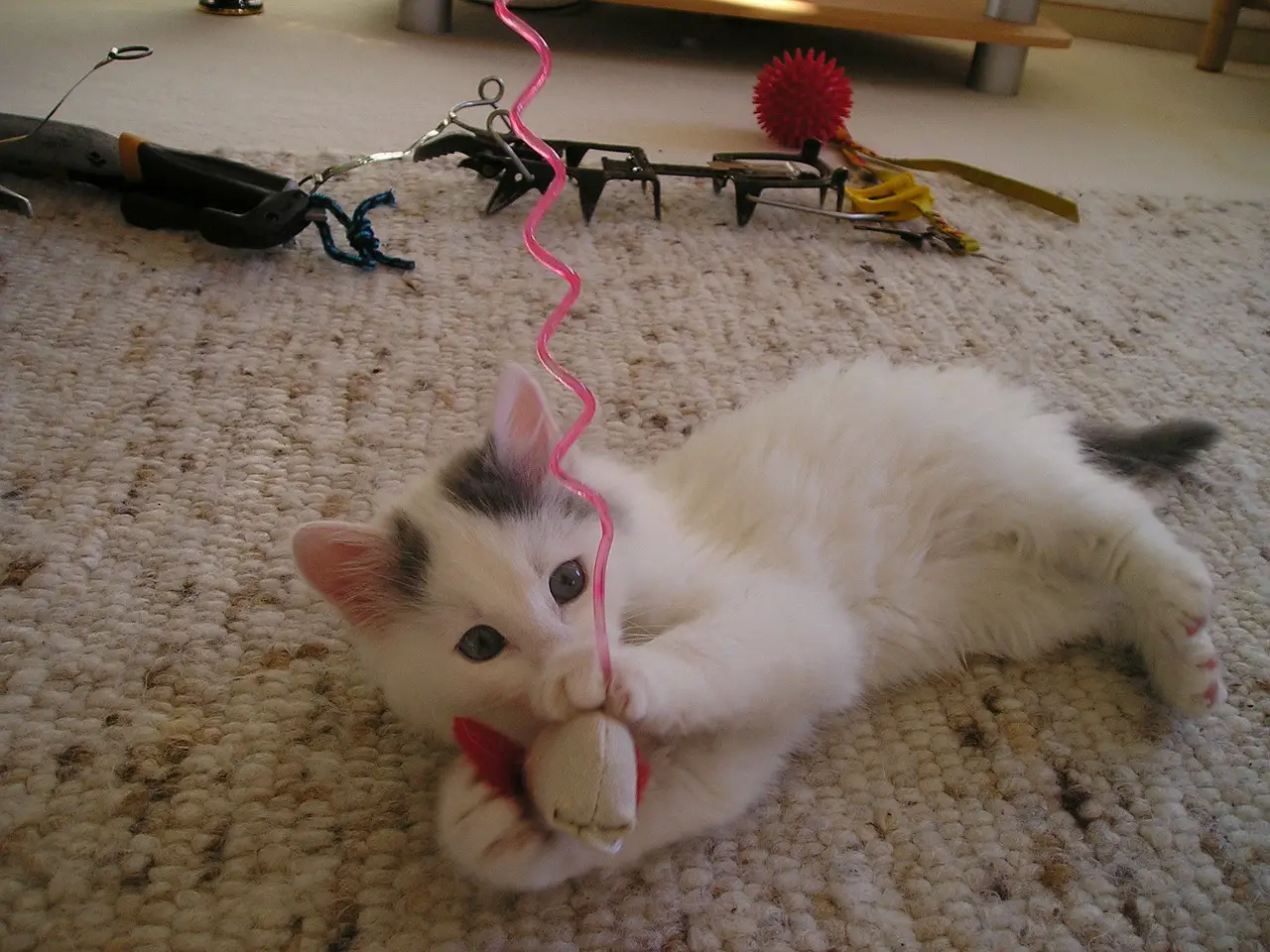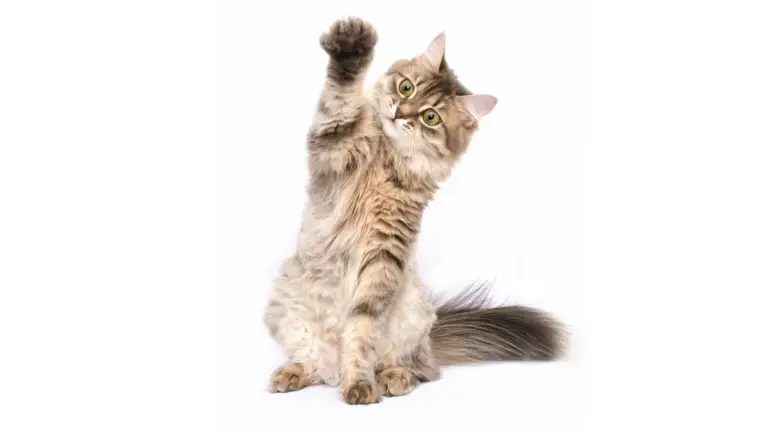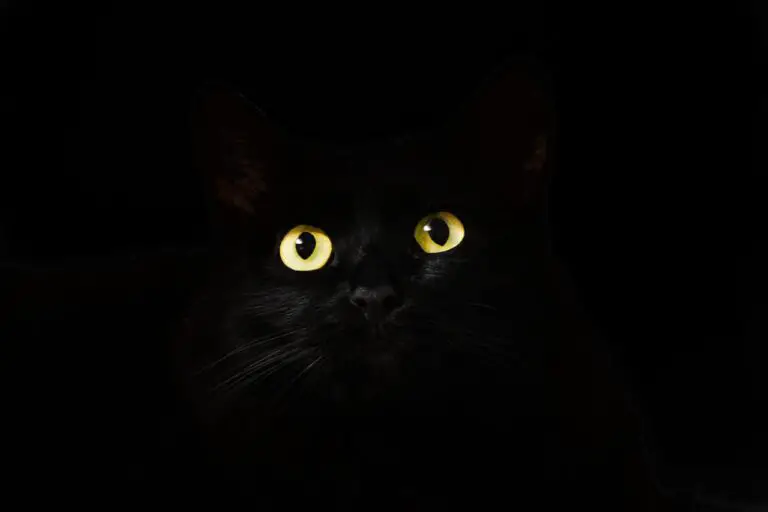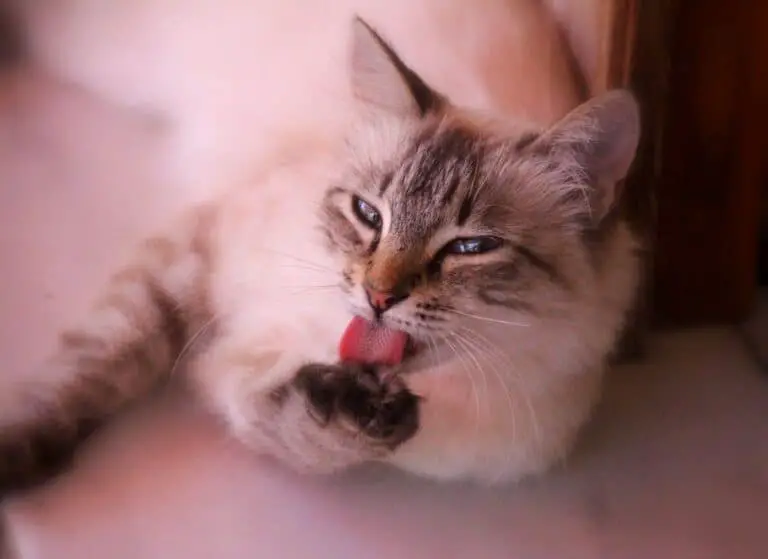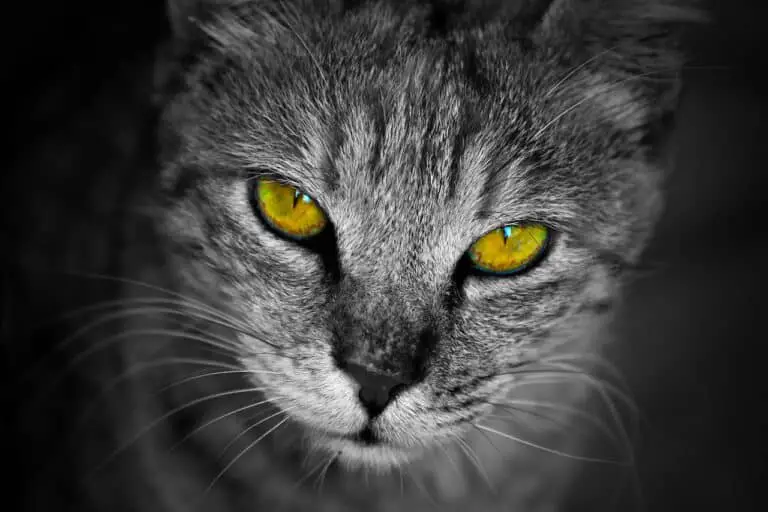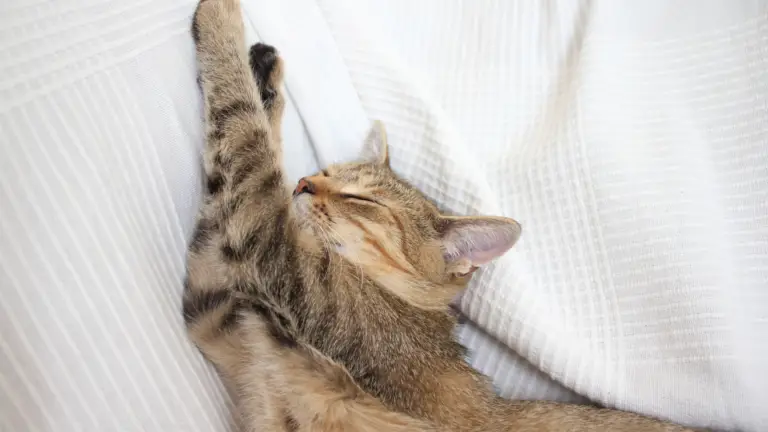WHY DO CATS EAT PLASTIC? 3 TOP REASONS AND REMEDIES
Why do cats eat plastic each time they see it? Cats seem to have a radar for plastic bags and anything made of plastic around the house. But why is that? Is there something in plastic that attracts cats? We are goint to solve this mystery today.
Cats eat plastics because they like the sounds, the crinkle of the plastics, the smell of the food in it, the smooth surface under the paws and tongue, and curiosity. Cats like to chew on plastic because they are teething, stressed, have pica, are bored, and have other health conditions.
Let’s see what what can be done to keep cats away from plastics.
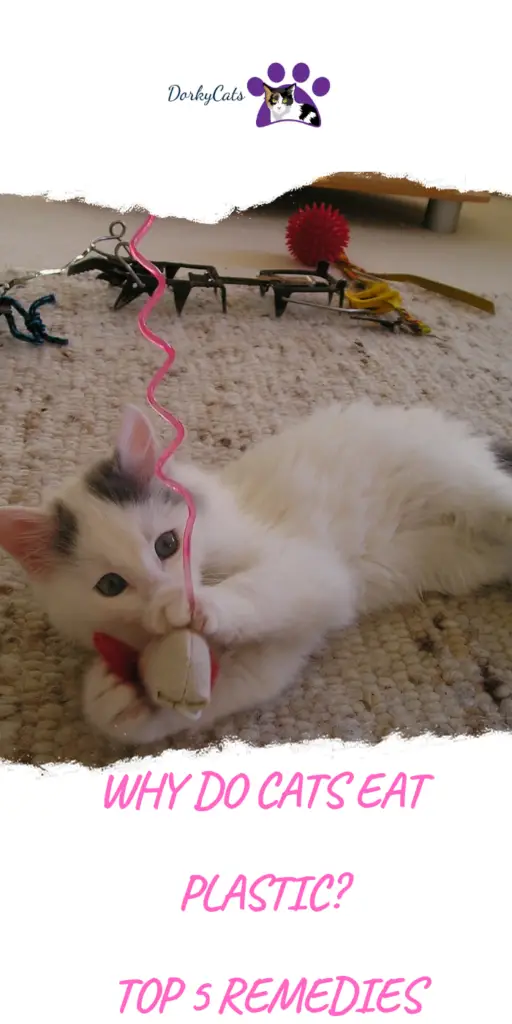
WHY DO CATS EAT PLASTIC OR CHEW IT?
If you have one or more cats, you cannot have missed the point of their attraction to plastics. It may be the reason why you make every plastic bag disappearing as soon as possible.
But cats are magnificent a finding plastic, even if you try to put them out of sight. If you are lucky, they may end up just chewing it, but some cats can even ingest it.
Let’s figure out what are the reasons for a cat eating and chewing plastic.
1. CATS ARE TEETHING
If you have a kitten, it is totally expected that he will try to chew nearly everything he can put his mouth on. Kittens are born without teeth, just like humans. When they reach three weeks of age, deciduous teeth (milk teeth) start to erupt until 6 to 8 weeks of age.
The actual teething starts at about ten weeks to 6 months of age. At month 7, kittens should have all of their 30 adult teeth. But, what happens during this period?
Kittens may experience the following:
- Less appetite
- Less grooming
- Red gums
- Pain (which you can’t see)
- Red gums
- Gums bleeding
- Excessive chewing
Of course, what interests us, is excessive chewing. Kittens will try to relieve the pain and discomfort caused by teething using a chew toy, or if they do not have a toy, they will try to chew on other things they find around in the house. Kitten usually attach furniture, electrical cords, plastics bags, wires, and anything that can fit in their mouth..
REMEDY
Plastic, of course, is one of those things that kittens may try to chew to get some relief. If this is the case and your kitten ends up with too much plastic in his mouth, you could try giving him a wet washcloth or a braided reop.
You can also find kitten chew toys in pet shops or nylon-based toys. Letting your kitten chew plastic can be dangerous if it is ingested.
2. CATS WANT TO PLAY
Plastic appeals to cats senses for different reasons, for example the plastic crinkle, which is the soft crackling sound that it makes when touched or while your cat is chewing it. Cats seems to be attracted a lot from plastic bags.
It is not uncommon to see them attacking a plastic bag, chew it, or get inside one. The sound of it is one of the reason for sure, however the other reason is the smell. If you carried food in it, your cat is attracted from the smell of it still in the bag.
In most cases, it is obvious they want to play with it. My cats go crazy if I give them a plastic bag to play with for few minutes. They try to go inside it, chew it, pull it with their teeth, and run away with it.
Sometimes I see that they even jump on it over and over. It is a lot of fun for them because of the sounds and the feel of texture under their paws and the fact that they can move it and get in it.
REMEDY
The remedy for this is to take away plastic from cats’ reach and replace it with toys. If you want to play with your cat using a plastic bag, be sure they are not chewing it and that you are with them at all times. Remove it after you are done playing with them.
3. HEALTH PROBLEMS
If your cat is not only chewing for fun but actually eating plastic and ingesting pieces of it, he may have health issues such as pica.
Pica is an eating disorder that urges cats to eat non-edible materials such a plastic, wool, air binders, cardboard, paper, and other fabrics. It is most common in young cats, and it is believed that it happens when cats are weaned too early.
But there are other reasons for cats having pica, such as dietary deficiencies, genetics, boredom, compulsive disorder, or stress. Typically cats affected by pick will chew or tear apart objects and try to grind objects with the back molar teeth before ingesting them.
Pica is not the only disease or disorder that can cause them to eat plastic. For example, they can have any of the following:
- Aggression problems cause by pains, poor socialization, and stress
- Obsessive-compulsive disorder
- Diabetes
- Dental issues such as periodontitis, gingivitis, and tooth resorption
- Anemia
- Hyperthyroidism
- Gastrointestinal disease
- Brain tumor
Stress alone can cause a lot of unwanted behavior and health problems. Cats are easy to stress. Even small environmental changes can stress cats. Stress can be caused in cats by things like:
- New people at home
- New pets
- Changes
- Not enough food and water
- Dirty litter
- Loud noises
- Routine changes
- Trips to the vet
REMEDY
To spot pica or other health condition signs, you have to observe your cat and see changes in their eating habits or other suspicious symptoms like diarrhea, vomiting, lethargy, and anything unusual.
Once you see something is wrong, seek the veterinarian’s attention. If your cat has ingested plastic and if he can’t get rid of it, he can be in danger. The vet can visit your cat and find out if surgery is needed or not.
But, if nothing is done and pieces of plastic block his digestive system, he may die. Since it can degenerate fast, you have to be quick to go to the vet.
CAN MY CAT DIE FROM EATING PLASTIC?
A cat can die from eating plastic in the worst cases. In fact, if the piece of plastic ingested doesn’t go through the digestive system and if it doesn’t get eliminated with poop, it means that it can stay in the stomach and cause a blockage.
If that happens, a cat can die from it, and it can be relatively fast. Bringing a cat to the vet quickly can save his life in case surgery need to be done.
If you think your cat has ingested a piece of plastic, you have to supervise him closely. You have to check if he is pooping, eating and drinking. If you see him lethargic and unable to eat or drink and if he doesn’t poop, you have to bring him to the vet.
If he ate a small piece of plastic, and you know it was a soft type of plastic, you could watch him for 10 to-24 hours to see if the material is passing through the digestive tract and if he is doing fine. You could call the vet and see if there is anything that you can give your cat to assist the process, such as a laxative or another thing.
You may want to check the litter box to see if the plastic material is finally out and keep checking your cat for any signs of problems.
WHAT SHOULD I DO IF MY CAT EAT PASTIC?
Sometimes, cats get to eat a bigger piece of plastic-like rubber bands or ribbons. In this case, there are higher chances that this type of material can become trapped in the stomach. If it is not resolved fast, a cat can die.
The sign of obstructions of the digestive system can be:
- Retching
- Vomiting
- Lethargy
- Not eating
- Abdomen is painful to touch
- Diarrhea (in partial obstruction)
- Constipation
Bring your cat to the vet at the first indication that there is something wrong, or bring him to emergency care. Plastic objects may cause injuries to the stomach and create infections. The vet can do X-rays and remove a plastic piece that is still on the abdomen through endoscopy.
If you wait too long and the plastic move into the intestine, the vet may need to perform surgery, which is more complex and harder on your cat. It is always best to make a trip to the vet to be sure everything is fine then wait for things to worsen.
HOW CAN I STOP MY CAT FROM EATING PLASTIC?
As we all know, cats do not follow directions very well. Besides, they are pretty sneaky when they want to get to something. It is very pretty much impossible to monitor all of their moves. But, there are still various preventive methods to use.
Here some of the best ways to prevent your cat from eating plastic:
REMOVE PLASTIC ITEMS
Of course, the best preventive method is to remove plastic bags and small plastic objects from your cat’s reach. Anything that can be easily ingested should be taken away. Observe what your cat is putting in his mouth, and make sure to take it away as soon as possible.
USE SAFE CATS TOYS
Your cat still needs to play and chew on something. There are safe cat toys that can be given to a cat for this purpose. Make sure to buy enough exciting toys for your cat to play, be active, and keep his interest in them and not on plastic.
USE NATURAL REPELLENTS
Use natural repellents you can spray on the objects your cat keeps chewing to keep him away. Individuate the things that your cat is targeting or may target, and the use of natural products make them unattractive.
REDUCE STRESS
Suppose you suspect that your cat is chewing on plastic and other objects due to stress. Figure out the changes in the environment that stress your cat and remove it. Ask the vet if there is anything you can give your cat to reduce stress and anxiety.
HEALTH CHECK
If you tried the most common remedies, and still your cat is chewing on plastic, you could have him checked for various illnesses to make sure he is ok, and you can rule out health problems. If the vet finds any issue, at least you can proceed with the cure.
TRAINING
Another alternative could be to train a cat, with the help of professionals, to understand what objects he should play with and avoid. You could also teach him to recognize your commands, so he will listen to you when you do not want him to do something.
RELATED QUESTIONS
Here some related questions and answers:
- Is it normal for cats to eat plastic?
Cats and kittens may chew on plastic and different objects because of their playing habits. In the wake of their play, they may ingest plastic. But, it is not normal for cats to eat a lot of plastic.
- Can cats pass plastic?
It is easier for small and soft piece of plastic to pass. However, be aware that plastic material can create a blockage in your cat stomach, and can be very dangerous if not resolved in time.
- How do I know if my cat ate plastic?
You could spot that your cat ate plastic by the fact that he is not eating, not drinking, not pooping, or has diarrhea. Your cat may look lethargic and be in pain. If you see that your cat as any of this manifestations, you should get him to the vet for a visit.
CONCLUSION
I hope you found some helpful information. If you have any question or want to add anything, leave it in the comments below.

